Chinese official’s fake Australian soldier photo sets us a Twitter trap
The sheer ballsiness of one of China’s “wolf warrior” diplomats was calculated pitch-perfectly to provoke reaction, writes James Morrow. How should we react? Take our poll.
Opinion
Don't miss out on the headlines from Opinion. Followed categories will be added to My News.
Here’s a little thought experiment for you: If Chinese special forces were accused of committing war crimes overseas, do you think Beijing would investigate the matter and then issue a very public and highly embarrassing report revealing their misdeeds for all the world to see?
Of course not.
Indeed it’s tempting, given the country’s behaviour from Xinjiang to Hong Kong, to say they’d probably give the troops in question a medal.
Which makes Monday’s tweet heard ‘round the world all the more galling.
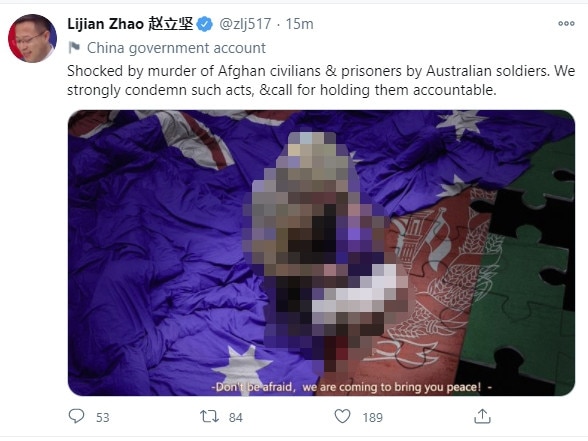
The idea that China — China! — of all nations would suddenly decide to come across as peacenik as a bearded old crusty selling Green Left Weekly is just too much to bear.
In Yiddish, the word is chutzpah — often jokingly described as what someone has who kills their parents, then throws themselves on the mercy of the court on account of being an orphan.
And that’s about the sum of it.
Because how else can you look at a nation whose totalitarian government maintains concentration camps, uses political prisoners for slave labour, and so much besides criticising Australia for bad behaviour?
Of course no nation is perfect, but the cognitive dissonance is almost too much to bear.
The tweet in question, sent by one of China’s chief “wolf warrior” diplomats, was so over the top that it is almost sure to cause a miscalculation and an over-reaction.
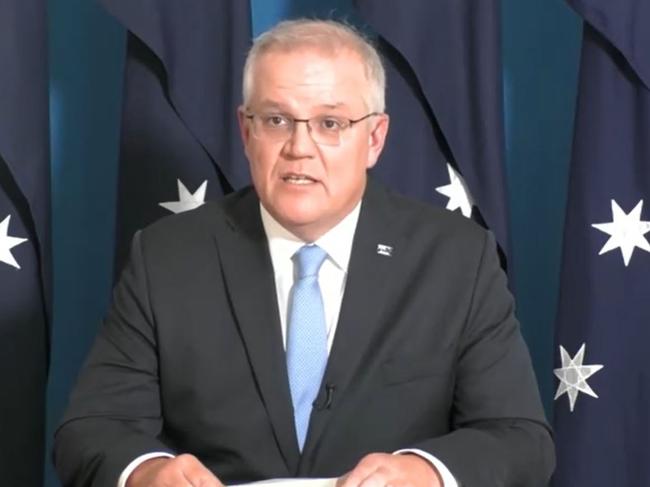
Coming from the account of Foreign Ministry spokesman Zhao Lijian, it read, “shocked by murder of Afghan civilians & prisoners by Australian soldiers …. we strongly condemn such acts, & call for holding them accountable”.
To drive the point home, Zhao included a fake photo of an Australian soldier holding a knife to a child’s throat over an Afghan flag.
Its sheer ballsiness was calculated pitch-perfectly to offend the government’s honour, provoke reaction, and (this is the real trap) wedge the Australian electorate into two camps.
The aim, from Beijing’s point of view, is to shift attention from Australians’ increasingly bipartisan anger at their economic bullying and divide the country roughly into two camps: On the one side the China hawks, mostly on the right, who think we should keep going hard in our dealings with the CCP and give them no quarter.
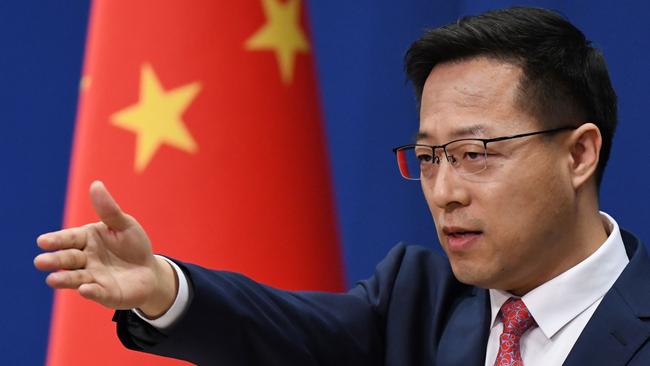
And on the other, the doves, whose instincts are to think that if we’ve got a problem with another nation, it’s probably our fault, and who tend to hold common cause with an Australian left that’s happy to see anyone take the near-sacred place of Australia’s military down a peg.
This faction has been increasingly in evidence as things have heated up between our two nations.
Last week commentators on the left were quick to blame the Morrison government’s diplomacy, and not China’s claims against Australia’s sovereignty, for increased tariffs on Australian wine.
If we’d just given in, everything would be fine, is the implication.
The same goes for those who say we should never have taken the lead on demanding an investigation of the origins of the COVID-19 pandemic.
You can understand how China might think they’d get what they think is a fair hearing in some quarters here.
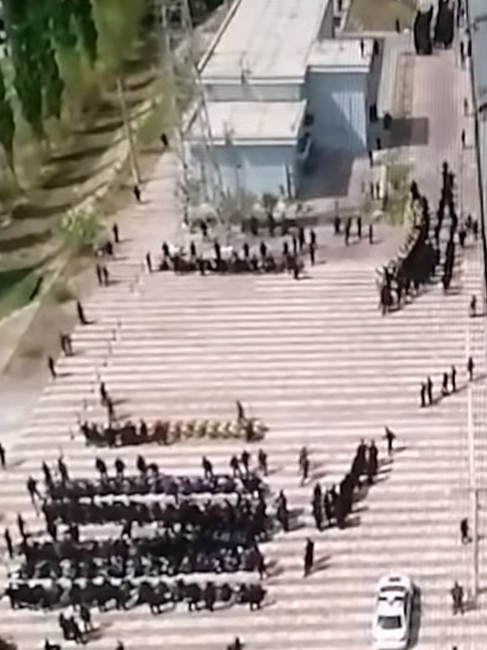
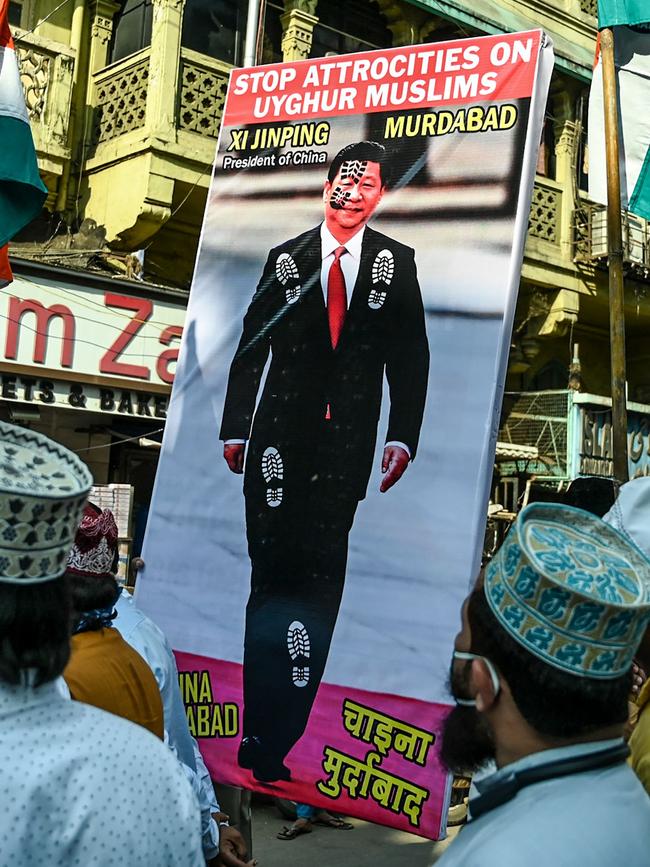
As a strategy it’s a direct echo of the old Soviet Union which, during the Cold War, sought to distract attention from its own human rights horror show by pointing to America’s civil rights dramas and the plight of Blacks living in the inner city.
After all, they would ask, how can you complain about gulags when there are ghettos just down the road from the White House?
There’s an added bonus, too, for Beijing: The tweet is a real turnabout on China’s long, ongoing complaint that Western nations like Australia need to stop judging their human rights record by our standards.
“How do you like them apples?”, Zhao’s tweet all but taunts.
That’s why we need to be careful.
Scott Morrison was absolutely right to fire up about the issue. His description of the tweet as “repugnant” doesn’t begin to plumb its raw grossness, but his statement that China should be “totally ashamed” will get him nowhere with a communist dictatorship that is entirely shameless.
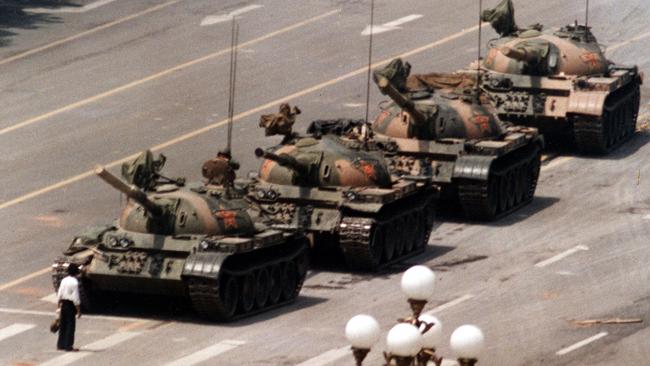
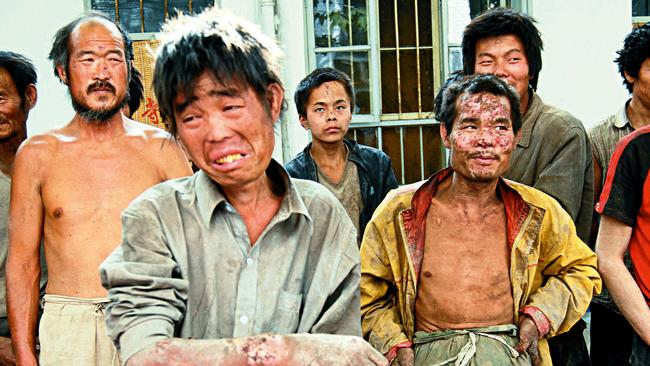
Likewise, it was heartening to see Labor rise to the occasion and similarly condemn China.
But just as a small child feels power in pushing his parents’ buttons and making them lose their temper, so too will Beijing delight in Australia’s rage. Particularly given that Beijing has spent the last year in a spluttering temper against Australia.
That’s why, if China has decided that it wants to play at the table of human rights, we should take them at their word.
This doesn’t mean directing Foreign Minister Marise Payne to wear out her thumbs tweeting abuse at Beijing.
But it does mean that we can say, fine, we are not perfect, but that we would put our human rights record up against China’s any day of the week.
Here the government can calmly and rationally address the nation and the world and say things too many people don’t like to hear, despite there being clear proof for anyone who cares to look for it.
Things such as China harvests organs. And China maintains concentration camps. And China uses slave labour. And China takes hostages.
And that China has its sights set on dominating Taiwan and the Pacific, and it will be very bad news for Australia if their plans come off.
Indeed, the consequences will be far harsher than mean tweets or more expensive consumer goods.
And it’s a question of pay now, or pay later.





